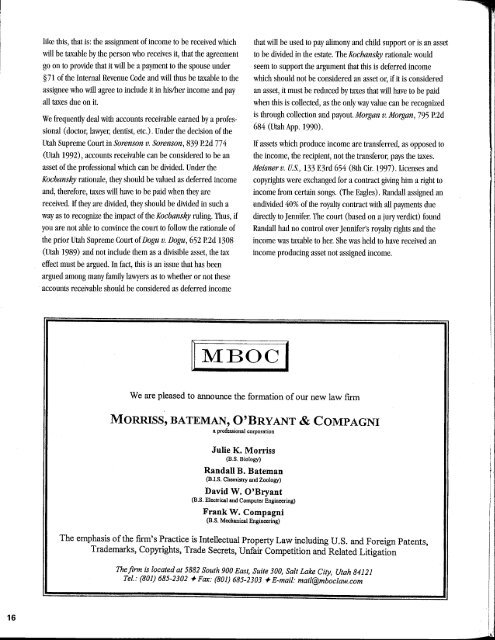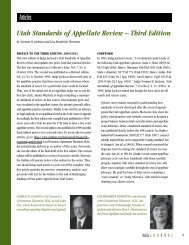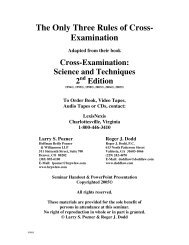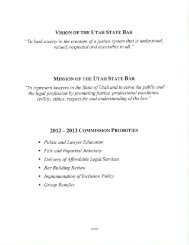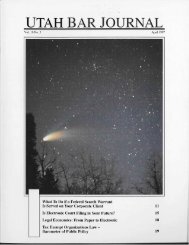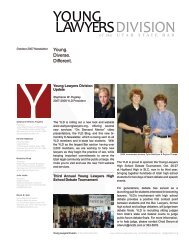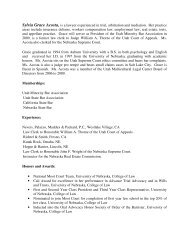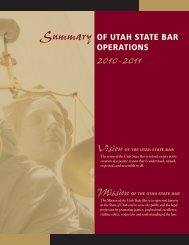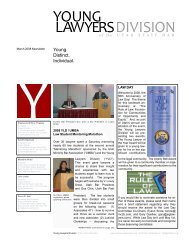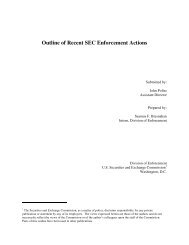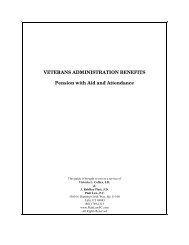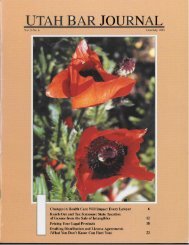March 1999 Volune 12 No3 - Utah State Bar
March 1999 Volune 12 No3 - Utah State Bar
March 1999 Volune 12 No3 - Utah State Bar
You also want an ePaper? Increase the reach of your titles
YUMPU automatically turns print PDFs into web optimized ePapers that Google loves.
16<br />
like this, that is: the assignment of income to be received which<br />
wi be taxable by the person who receives it, that the agreement<br />
go on to provide that it wil be a payment to the spouse under<br />
§ 71 of the Internal Revenue Code and wil thus be taxable to the<br />
assignee who wi agree to include it in hislher income and pay<br />
al taxes due on it.<br />
We frequently deal with accounts receivable earned by a profes-<br />
sional (doctor, lawyer, dentist, etc.). Under the decision of the<br />
<strong>Utah</strong> Supreme Court in Sorenson v. Sorenson, 839 P.2d 774<br />
(<strong>Utah</strong> 1992), accounts receivable can be considered to be an<br />
asset of the professional which can be divided. Under the<br />
Kochansky rationale, they should be valued as deferred income<br />
and, therefore, taxes wil have to be paid when they are<br />
received. If they are divided, they should be divided in such a<br />
way as to recognize the impact of the Kochansky ruling. Thus, if<br />
you are not able to convince the court to follow the rationale of<br />
the prior <strong>Utah</strong> Supreme Court ofDogu v. Dogu, 652 P.2d 1308<br />
(Uta 1989) and not include them as a divisible asset, the ta<br />
effect must be argued. In fact, this is an issue that has been<br />
argued among many famy lawyers as to whether or not these<br />
accounts receivable should be considered as deferred income<br />
that wil be used to pay almony and chid support or is an asset<br />
to be divided in the estate. The Kochansky rationale would<br />
seem to support the argument that this is deferred income<br />
which should not be considered an asset or, if it is considered<br />
an asset, it must be reduced by taxes that wi have to be paid<br />
when this is collected, as the only way value can be recognized<br />
is through collection and payout. Morgan v. Morgan, 795 P.2d<br />
684 (<strong>Utah</strong> App. 1990).<br />
~MBOCI<br />
If assets which produce income are transferred, as opposed to<br />
the income, the recipient, not the transferor, pays the taxes.<br />
Meisnerv. U.S,) 133 F.3rd 654 (8th Cir. 1997). licenses and<br />
copyrights were exchanged for a contract giving him a right to<br />
income from certain songs. (The Eagles). Randal assigned an<br />
undivided 40% of the royalty contract with al payments due<br />
directly to Jennier. The court (based on a jury verdict) found<br />
Randal had no control over Jennier's royalty rights and the<br />
income was taxable to her. She was held to have received an<br />
income producing asset not assigned income.<br />
We are pleased to anounce the formation of our new law fim<br />
MORRSS, BATEMAN, O'BRYANT & COMPAGNI<br />
a profesional corporation<br />
Julie K. Morriss<br />
(RS. Biology)<br />
Randall B. Bateman<br />
(B.1.s. Chemistr and Zoology)<br />
David W. O'Bryant<br />
(B.S. Electrical and Computer Engineeing)<br />
Frank W. Compagni<br />
(B.S. Mecanical Engineering)<br />
The emphasis of the fim's Practice is Intellectual Property Law including U.S. and Foreign Patents,<br />
Trademarks, Copyrights, Trade Secrets, Unfair Competition and Related Litigation<br />
Thefinn is located at 5882 South 900 East, Suite 300, Salt Lake City, <strong>Utah</strong> 84<strong>12</strong>1<br />
Tel.: (801) 685-2302 + Fax: (801) 685-2303 +E-mai/: mail&Jmboclaw.com<br />
:i',


